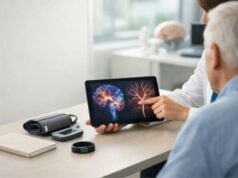
What is amnestic disorder?
Amnestic Disorder is a cognitive condition marked by the inability to form new memories or recall previous events. Unlike general memory loss caused by aging, amnestic disorder impairs memory function while leaving other cognitive abilities intact. This disorder can be caused by a variety of factors, including brain trauma, alcohol abuse, neurological diseases such as Alzheimer’s, and vitamin deficiencies, particularly thiamine (vitamin B1).
Amnestic disorders are typically classified into two types: anterograde amnesia, in which patients are unable to form new memories, and retrograde amnesia, in which individuals struggle to recall previous experiences. While some forms of amnesia are temporary and reversible, others can result in long-term or permanent memory loss. This can have a significant impact on an individual’s ability to live a normal life, as memories are essential for personal identity, social relationships, and daily functioning. Treating amnestic disorders necessitates a combination of approaches that address both the underlying cause and the symptoms, ranging from traditional therapies to novel neuroscience breakthroughs.
Traditional and Standard Treatment Options for Amnestic Disorder
Over the years, medical professionals have used a variety of treatments to manage amnestic disorders, focusing primarily on addressing the underlying cause of the condition while also providing support for the resulting memory deficits. Historically, the emphasis has been on halting the progression of memory loss, restoring cognitive function, and preventing additional neural damage. Traditional treatment methods usually include a combination of medication, cognitive rehabilitation, and nutritional support.
1. Thiamine Supplementation for Alcohol-Related Amnesia Disorders
One of the most well-known causes of amnestic disorder is Korsakoff’s Syndrome, which results from severe thiamine (vitamin B1) deficiency and is frequently associated with chronic alcohol abuse. Thiamine is necessary for normal brain function because it aids in the metabolism of glucose. Without enough thiamine, neurons begin to deteriorate, especially in brain regions such as the thalamus and hippocampus, which are critical for memory.
Korsakoff’s Syndrome requires immediate thiamine supplementation. High doses of intravenous thiamine are usually given as soon as possible, especially when patients have Wernicke’s encephalopathy, which is a precursor to full-blown amnestic disorders. Early treatment can halt disease progression and, in some cases, restore partial memory function. However, for patients with severe and prolonged deficiencies, memory loss may be irreversible.
2. Cognitive Rehab and Memory Training
Cognitive rehabilitation is still one of the most widely used therapies for amnestic disorders. It is especially useful for people with anterograde amnesia, who are unable to form new memories. Cognitive rehabilitation uses a variety of techniques to stimulate brain regions responsible for memory retention and compensate for lost memory capacity.
- Memory training exercises: Patients collaborate with therapists to improve their ability to encode and retrieve data. To improve short-term memory, practice repeating facts or events.
- External memory aids: People with amnestic disorders are frequently encouraged to use external tools like smartphones, calendars, and notebooks to manage their daily activities. These aids help patients compensate for memory deficits and maintain their independence.
- Errorless learning: This method involves reinforcing correct responses and minimizing mistakes during learning exercises in order to reduce confusion and improve memory retention. It is especially beneficial for people who have severe memory loss because it enhances their remaining cognitive abilities without overloading their impaired memory systems.
Cognitive rehabilitation programs are highly individualized and are typically structured around the patient’s level of memory impairment and ability to engage in therapeutic interventions. The goal is not only to improve memory function, but also to help patients develop coping strategies for the limitations imposed by their disorder.
3. Medications For Cognitive Enhancement
While there is no cure for amnestic disorders, certain medications have been shown to improve memory and cognitive function. These treatments are especially prevalent in cases where amnestic disorders are associated with neurodegenerative diseases such as Alzheimer’s.
- Cholinesterase inhibitors: Drugs like donepezil and rivastigmine are commonly used to boost acetylcholine levels in the brain, which is a neurotransmitter involved in memory and learning. These medications, which prevent the breakdown of acetylcholine, can improve cognitive function, albeit with modest benefits, and are commonly used in patients with Alzheimer’s-related memory disorders.
- NMDA receptor antagonists: Memantine is an NMDA receptor antagonist that regulates glutamate activity in the brain. Excessive glutamate activity can cause neuronal damage, so by modulating this neurotransmitter, memantine may provide some neuroprotection and cognitive support in patients with memory deficits.
While these medications treat symptoms, they do not address the underlying damage to the brain’s memory-forming regions. As a result, they are typically used to supplement rather than treat.
4. Psychotherapy & Counseling
Individuals with amnestic disorders caused by psychological trauma, such as dissociative amnesia, may benefit from psychotherapy as part of their treatment. Memory loss in dissociative amnesia is frequently a psychological defense mechanism brought on by extreme stress or trauma. Cognitive-behavioral therapy (CBT) is a popular method for helping patients address the underlying emotional conflicts that contribute to memory suppression.
In dissociative amnesia, recovery frequently entails assisting the patient in accessing repressed memories in a safe therapeutic setting. In addition to more traditional forms of psychotherapy, techniques like hypnotherapy and eye movement desensitization and reprocessing (EMDR) may be used to aid memory retrieval.
5. Occupation and Social Support
Supporting people with amnestic disorders frequently entails creating structured environments to aid in daily activities. To promote independence, occupational therapists assist patients in relearning essential skills and incorporating memory aids into their daily routine. Family members and caregivers also play an important role in assisting the individual to navigate daily life with minimal confusion or frustration.
Groundbreaking Innovations in Amnestic Disorder Treatment
As neuroscience and medical technologies advance, new treatment approaches emerge, providing hope for people suffering from amnestic disorders. These innovations seek to go beyond symptomatic management by addressing the underlying causes of memory loss and investigating ways to restore or regenerate damaged neural pathways. The following are some of the most promising breakthroughs in the treatment of amnestic disorders.
1. Neurostimulation techniques
Neurostimulation is one of the most promising research areas for treating cognitive disorders, such as amnesia. These techniques, which directly stimulate brain regions responsible for memory, have the potential to improve neuroplasticity, or the brain’s ability to reorganize itself and form new neural connections.
- Transcranial Magnetic Stimulation (TMS): TMS is a non-invasive neurostimulation technique in which magnetic fields stimulate nerve cells in the brain, particularly in the prefrontal cortex. Research has shown that repetitive TMS sessions can improve memory performance by increasing brain plasticity. Early research suggests that TMS can be especially effective for patients with anterograde amnesia, as it aids in the encoding and retrieval of new memories.
- Deep Brain Stimulation (DBS): While DBS is most commonly used to treat movement disorders such as Parkinson’s disease, recent research has looked into its potential application in memory disorders. DBS involves implanting electrodes in specific brain regions to control abnormal neural activity. In severe amnestic disorders, DBS may stimulate the hippocampus, the brain’s memory center, improving memory formation and retrieval. Although still in the experimental stage, DBS has great potential for treating severe cases of memory loss.
2. stem cell therapy
Stem cell therapy is yet another advancement in the treatment of neurological disorders, including amnestic disorder. Because the brain’s ability to regenerate neurons is limited, stem cells hold promise for restoring lost cognitive functions.
Stem cells have the unique ability to differentiate into a variety of cell types, including neurons, suggesting that they could potentially replace damaged brain cells in memory-critical regions. Early studies have shown that implanting neural stem cells in animal models can regenerate memory-related brain regions, such as the hippocampus. While human trials are still in their early stages, stem cell therapy holds promise as a future treatment for people suffering from severe amnesia caused by brain injury or neurodegeneration.
3. Genetic Therapy
Gene therapy is a cutting-edge field that shows promise for treating amnestic disorders by targeting genetic abnormalities that cause memory loss. Scientists can use viral vectors or other delivery mechanisms to modify gene expression in specific brain regions, thereby improving neuroplasticity and memory.
For example, researchers are looking into ways to increase the production of brain-derived neurotrophic factor (BDNF), a protein that promotes neuron survival and synaptic plasticity. Gene therapy, which increases BDNF levels in the brain, may aid in memory recovery in patients with amnestics. Though still largely experimental, gene therapy is a rapidly evolving field that may soon provide new treatments for memory disorders.
4. Artificial Intelligence(AI) and Machine Learning
AI and machine learning are transforming how clinicians approach cognitive rehabilitation for amnestic disorders. AI algorithms can personalize treatment plans for individuals based on their specific memory deficits and therapeutic responsiveness by analyzing massive amounts of patient data.
- AI-driven cognitive rehabilitation: AI-powered platforms can generate customized memory exercises that adjust to the patient’s progress, resulting in a highly personalized approach to cognitive rehabilitation. These platforms can also monitor patient responses in real time, allowing therapists to adjust task difficulty as needed to improve outcomes.
Furthermore, machine learning algorithms are being used to analyze brain imaging and neurobiological data in order to predict treatment outcomes and detect early signs of recovery in people suffering from amnestic disorders. By identifying patterns and trends, AI can assist clinicians in refining treatment strategies, potentially leading to more effective and personalized care for patients with memory impairments.
5. Memory Prosthetics and Brain Computer Interfaces (BCIs)
One of the most futuristic innovations in the treatment of amnestic disorders is the development of memory prosthetics and **brain-computer interfaces (BCIs). These technologies aim to help or even replace damaged memory circuits in the brain, providing hope to people who have severe memory loss.
- Memory Prosthetics: Researchers are developing implantable devices that mimic the function of the hippocampus, which is essential for memory formation and retrieval. These prosthetics use electrical signals and sophisticated algorithms to replicate the neural processes involved in encoding and recalling memories. Early studies in animal models have yielded promising results, and researchers are now investigating human applications.
- Brain-Computer Interfaces (BCIs): BCIs enable direct communication between the brain and external devices. These systems are being developed to bypass damaged brain regions and assist patients with amnestic disorders in regaining lost memories or improving their ability to form new ones. While BCIs are still in the experimental stages, they represent a promising new frontier in neurological treatment, with the potential for significant cognitive recovery in patients with severe amnesia.
6. Pharmaceutical innovations
While traditional pharmacological treatments have had limited success in treating amnestic disorders, new drug development efforts are focusing on improving synaptic plasticity and promoting neural regeneration.
- Neuroprotective agents: Several experimental drugs are being tested for their ability to protect neurons from damage while also promoting the formation of new neural connections. One area of focus is on compounds that stimulate the production of brain-derived neurotrophic factor (BDNF), which is essential for memory formation and synaptic plasticity. These drugs, by increasing BDNF levels, may improve cognitive function in people with amnestic disorders.
- Epigenetic drugs: Epigenetic mechanisms regulate gene expression without modifying the DNA sequence. Epigenetic drugs that target these mechanisms are being investigated for their ability to improve cognitive recovery by “turning on” genes involved in memory formation and neural plasticity. These drugs may provide a novel approach to treating amnestic disorders by targeting the underlying biological processes that contribute to memory loss.
Alternative and Complementary Treatments for Amnestic Disorder
In addition to traditional and cutting-edge medical treatments, many patients with amnestic disorders seek alternative and complementary therapies to improve their cognitive health and recovery. While these methods may not directly treat the underlying cause of amnestic disorder, they can help improve overall well-being, support memory function, and reduce stress.
1. Nutrition Therapy
A growing body of evidence suggests that proper nutrition is critical for maintaining cognitive health, particularly in people with memory disorders. Nutritional therapy focuses on giving the brain the nutrients it needs to function properly.
- Omega-3 fatty acids: Omega-3 fatty acids, which are found in fish oil and certain seeds, have been shown to improve brain health by promoting neurogenesis and lowering inflammation. These fatty acids may increase synaptic plasticity, which is necessary for memory formation and retrieval.
- Antioxidants: Fruits and vegetables contain antioxidants such as vitamin E, vitamin C, and flavonoids, which protect neurons from oxidative stress, a major cause of cognitive decline. Antioxidants may help slow memory loss by reducing damage to brain cells.
- Thiamine supplementation: As previously stated, thiamine deficiency can result in severe amnestic disorders such as Korsakoff syndrome. Individuals at risk require nutritional therapy that focuses on adequate thiamine intake, along with other B vitamins, to prevent and manage memory deficits.
2. Mindfulness & Meditation
Mindfulness-based therapies have gained attention for their ability to improve cognitive function, reduce stress, and boost emotional well-being. Mindfulness entails paying attention to the present moment without judgment, which can help people with memory impairments stay focused and less anxious.
- Meditation: Studies have shown that regular meditation promotes neuroplasticity and improves attention, memory, and cognitive processing. Individuals with amnestic disorders may benefit from incorporating mindfulness and meditation into their daily routines to improve focus, mental clarity, and emotional resilience.
3. Physical exercises and yoga
Physical activity has long been linked to improved brain health, and it is especially important in promoting cognitive recovery in people who have memory disorders. Regular aerobic exercise boosts blood flow to the brain, promotes neurogenesis, and induces the release of brain-derived neurotrophic factor (BDNF), which is required for memory formation.
- Yoga combines physical postures, controlled breathing, and mindfulness to provide holistic health benefits to both the body and mind. Yoga has been shown in studies to improve focus, memory retention, and emotional regulation, making it an effective complementary therapy for people with amnestic disorders.
4. Herbal Supplements
Certain herbal supplements have long been used to improve memory and cognitive function. While additional research is required to establish their efficacy, some herbs have shown promise in preliminary studies for individuals with memory impairments:
- Ginkgo Biloba: Ginkgo Biloba, known for its ability to increase blood flow to the brain and improve cognitive function, has been studied for its effects on memory. While the findings are mixed, some studies indicate that it may improve memory retention slightly.
- Bacopa Monnieri: Bacopa is a traditional Ayurvedic herb that has been shown to enhance cognitive function, memory retention, and learning. Its neuroprotective properties may aid cognitive recovery in those suffering from amnestic disorders.
- Rhodiola Rosea: Rhodiola is an adaptogenic herb that has been shown to reduce stress and fatigue. It may also improve focus and cognitive performance, making it a potential adjunct therapy for memory-related disorders.
5. Musical and Art Therapy
Music therapy and art therapy are creative forms of therapy that have been used to promote cognitive and emotional well-being in people with memory disorders. Music and art allow patients to express themselves nonverbally, which is especially useful for those with severe memory loss.
- Music therapy has been shown to improve mood, decrease anxiety, and improve memory recall, particularly when familiar or emotionally significant music is used. Music therapy can help individuals with amnestic disorders reconnect neural circuits involved in memory processing.
- Art therapy offers a creative outlet for emotional expression and can alleviate the frustration that often comes with memory loss. Individuals with amnestic disorders may benefit from engaging in artistic activities to improve cognitive function and emotional resilience.
6. Acupuncture
Acupuncture, a traditional Chinese medicine practice, has shown some promise for treating cognitive disorders such as memory loss. Acupuncture stimulates specific points on the body to improve energy flow (Qi) and balance. According to some studies, acupuncture may improve cognitive function by increasing blood flow to the brain, lowering inflammation, and promoting neuroplasticity.
While more research is needed to fully understand the role of acupuncture in amnestic disorders, it is a complementary therapy that may be beneficial when combined with traditional and innovative treatment approaches.






